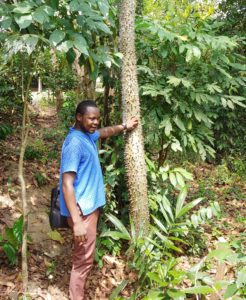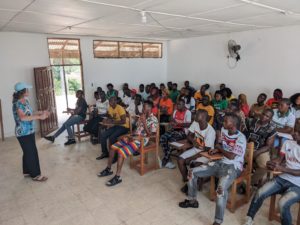Liberia has the most forest cover of any West African country, and these forests have sustained  indigenous societies for millennia. Today, Liberia’s forested landscapes face a future that holds both great promise and peril. The sustainability challenges arise at the nexus of the forests’ high commercial value as timber, their irreplaceable biodiversity value, their cultural and livelihood values to forest dwelling communities, and their carbon sequestration value for mitigating climate change. Achieving balance and building synergies among these values will require a new vision for Liberia’s forestry sector and its workforce, which has focused heavily on timber extraction for several decades.
indigenous societies for millennia. Today, Liberia’s forested landscapes face a future that holds both great promise and peril. The sustainability challenges arise at the nexus of the forests’ high commercial value as timber, their irreplaceable biodiversity value, their cultural and livelihood values to forest dwelling communities, and their carbon sequestration value for mitigating climate change. Achieving balance and building synergies among these values will require a new vision for Liberia’s forestry sector and its workforce, which has focused heavily on timber extraction for several decades.
Funded by USAID, a team of Liberian and U.S. forestry scholars and practitioners are collaborating to design a new national forestry curriculum that complements commercial forestry with content on biodiversity conservation, and multiple forest benefits to communities and climate. A salient and unique aspect of the new vision for forestry training is the inclusion of a Soft Skills Co-Curriculum, which aims to build personal, interpersonal, communications, and strategic competencies for the emerging, pluralistic forest sustainability job market, green entrepreneurship, and support of livelihoods in forest dwelling communities.
 I am the lead of the soft skills training initiative, guiding the curriculum co-production process, and supporting the early stages implementation of the Soft Skills Co-Curriculum at the University of Liberia and Liberia’s Forestry Training Institute.
I am the lead of the soft skills training initiative, guiding the curriculum co-production process, and supporting the early stages implementation of the Soft Skills Co-Curriculum at the University of Liberia and Liberia’s Forestry Training Institute.